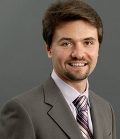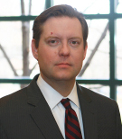Webinar, April 2017
Join Professor Nikolai Roussanov for an overview of his working paper Commodity Trade and the Carry Trade: A Tale of Two Countries. Co-authored with Robert Ready and Colin Ward, it received the 2016 Jacobs Levy Center Research Paper Prize for Best Paper. A discussion of the paper is presented by Mikhail Samonov of Forefront Analytics, and the webinar is hosted by Professor Chris Geczy, academic director of the Jacobs Levy Center.
About the Presentation
Persistent differences in interest rates across countries account for much of the profitability of currency carry trade strategies. The high interest rate “investment” currencies tend to be “commodity currencies,” while low interest rate “funding” currencies tend to belong to countries that export finished goods and import most of their commodities.
Professor Roussanov will discuss the paper’s general equilibrium model of international trade and currency pricing in which countries have an advantage in producing either basic input goods or final consumable goods. The model predicts that commodity-producing countries are insulated from global productivity shocks through a combination of trade frictions and domestic production, while the final good producers that drive the global business cycle also absorb the shocks.
About the Speakers
 Nikolai Roussanov is Moise Y. Safra Associate Professor of Finance at the Wharton School, University of Pennsylvania, and Research Associate at the National Bureau of Economic Research. His research focuses on areas of interaction between asset pricing and macroeconomics, ranging from equity to fixed income, currency, and commodity markets, to entrepreneurship and consumer financial behavior. His articles have been published in The Journal of Finance, Quarterly Journal of Economics, Journal of Financial Economics, The Review of Financial Studies, and Management Science, and won a number of prizes, including the 2015 AQR Insight Award. He currently serves on the board of directors of the Macro Finance Society and on editorial boards at The Journal of Finance and Journal of Monetary Economics. Professor Roussanov received an undergraduate degree in mathematics from Harvard College in 2001 and a Ph.D. in Finance from the University of Chicago in 2008.
Nikolai Roussanov is Moise Y. Safra Associate Professor of Finance at the Wharton School, University of Pennsylvania, and Research Associate at the National Bureau of Economic Research. His research focuses on areas of interaction between asset pricing and macroeconomics, ranging from equity to fixed income, currency, and commodity markets, to entrepreneurship and consumer financial behavior. His articles have been published in The Journal of Finance, Quarterly Journal of Economics, Journal of Financial Economics, The Review of Financial Studies, and Management Science, and won a number of prizes, including the 2015 AQR Insight Award. He currently serves on the board of directors of the Macro Finance Society and on editorial boards at The Journal of Finance and Journal of Monetary Economics. Professor Roussanov received an undergraduate degree in mathematics from Harvard College in 2001 and a Ph.D. in Finance from the University of Chicago in 2008.
 Mikhail Samonov is a Senior Portfolio Manager at Forefront Analytics, an institutional asset management and consulting firm in the Philadelphia area. He is a member of the firm’s management committee and is responsible for managing multi-asset and alternative portfolios, as well as ESG and impact investment strategies. In addition, he manages a team of researchers developing quantitative, factor-based, investment strategies. Mikhail is also a Teaching Associate at the Wharton School for the investments and impact investing classes taught by Professor Chris Geczy. He is actively involved in academic research on factor-based investing as well as impact investing and behavioral finance. Prior to Forefront, he founded the firm Octoquant, was Executive Director of CBID, and was a Vice President and Portfolio Manager in Structured Equities at PineBridge Investments. Mikhail holds a B.S. in applied mathematics and economics from Brown University, and an MBA from the Wharton School. He is a CFA Charterholder.
Mikhail Samonov is a Senior Portfolio Manager at Forefront Analytics, an institutional asset management and consulting firm in the Philadelphia area. He is a member of the firm’s management committee and is responsible for managing multi-asset and alternative portfolios, as well as ESG and impact investment strategies. In addition, he manages a team of researchers developing quantitative, factor-based, investment strategies. Mikhail is also a Teaching Associate at the Wharton School for the investments and impact investing classes taught by Professor Chris Geczy. He is actively involved in academic research on factor-based investing as well as impact investing and behavioral finance. Prior to Forefront, he founded the firm Octoquant, was Executive Director of CBID, and was a Vice President and Portfolio Manager in Structured Equities at PineBridge Investments. Mikhail holds a B.S. in applied mathematics and economics from Brown University, and an MBA from the Wharton School. He is a CFA Charterholder.
 Chris Geczy has been on the Finance Department faculty at the Wharton School of the University of Pennsylvania since 1997. He is academic director of the Jacobs Levy Equity Management Center for Quantitative Financial Research, and the Wharton Wealth Management Initiative at Wharton Executive Education. He has a B.A. in economics from the University of Pennsylvania and a Ph.D. in finance and econometrics from the Graduate School of Business at the University of Chicago (now the Booth School). Chris teaches investment management and co-created the first full course on hedge funds at Wharton, a course on impact investing, and a large number of executive education courses. His current research focuses multifactor models, wealth management, risk management, asset allocation, the performance of managed funds including hedge funds, venture capital and private equity as well as other alternatives, and various aspects of equity lending and short-selling. His work has appeared in numerous books and scholarly journals, and been covered in The Wall Street Journal, The New York Times, NPR and other media outlets.
Chris Geczy has been on the Finance Department faculty at the Wharton School of the University of Pennsylvania since 1997. He is academic director of the Jacobs Levy Equity Management Center for Quantitative Financial Research, and the Wharton Wealth Management Initiative at Wharton Executive Education. He has a B.A. in economics from the University of Pennsylvania and a Ph.D. in finance and econometrics from the Graduate School of Business at the University of Chicago (now the Booth School). Chris teaches investment management and co-created the first full course on hedge funds at Wharton, a course on impact investing, and a large number of executive education courses. His current research focuses multifactor models, wealth management, risk management, asset allocation, the performance of managed funds including hedge funds, venture capital and private equity as well as other alternatives, and various aspects of equity lending and short-selling. His work has appeared in numerous books and scholarly journals, and been covered in The Wall Street Journal, The New York Times, NPR and other media outlets.


